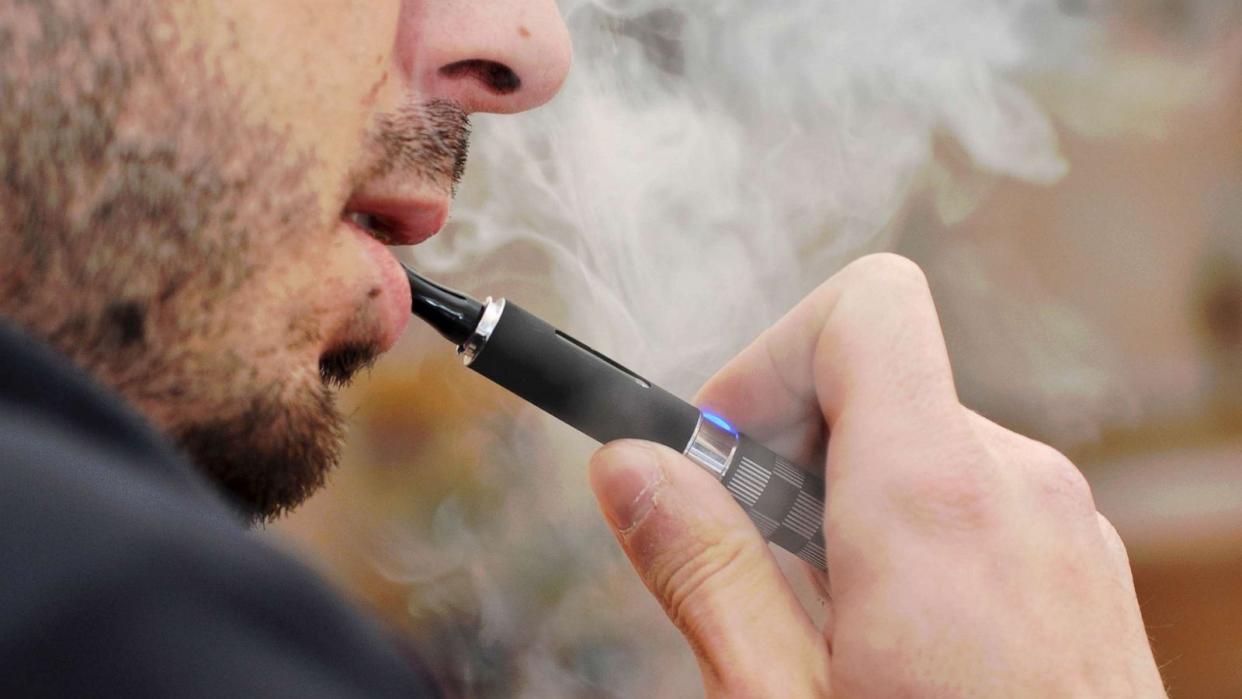Doctors increasingly discourage vaping amid mounting health concerns
Doctors are increasingly discouraging people from using e-cigarettes given the mounting evidence about the significant negative health impact of vaping-- even as a smoking cessation tool.
For current smokers, "there are other very powerful, safe and FDA approved interventions," Dr. Petros Levounis, the President of the American Psychiatric Association and Chair of the Department of Psychiatry at Rutgers New Jersey Medical School, said.
In July, new medical guidelines from the American College of Cardiology strongly discouraged the use of e-cigarettes, particularly in those with chronic heart disease. Even in young people, e-cigarettes have been shown to "increase heart rate, blood pressure and affect the ability of the blood vessels to relax," said Dr. Naomi Hamburg, Cardiologist and Professor of Medicine at Boston University. Using an alternative option that has been proven to be safe is ideal.

MORE: Video New warning about vaping issued
Though it was introduced to the U.S. markets in 2007, e-cigarette use has continued to soar. In the last two years alone, sales in the U.S. have increased by approximately 50%.
When compared to traditional cigarettes, e-cigarettes have often been portrayed as lesser of two evils. According to Levounis, the flavoring options, perceived reduction in harm when compared to classic cigarettes, more manageable odor and targeted campaigns towards vulnerable populations including youth may be the reason for this.
But studies show that e-cigarettes may cause harm by affecting the whole body.
A medical condition called EVALI – E-cigarette or Vaping-use Associated Lung Injury - not only causes damage to the lungs but can also cause issues in other organs' systems.
A CDC evaluation found that ingredients associated mostly with illicit TCH vaping products played a major role in the 2019 EVALI outbreak that peaked in September 2019.
The FDA says e-cigarettes may contain lower levels of harmful chemicals compared to conventional cigarettes, but that no tobacco products are considered safe.
"We just cannot make a conclusion that it is safer than cigarettes," said Dr. Jason Rose, a pulmonary and critical care physician who is also an associate professor of medicine and associate dean for innovation and physician science at The University of Maryland School of Medicine.
MORE: New study compares effects of smoking and vaping
Quitting tobacco from conventional cigarettes can be very challenging for most people.
But doctors are now warning that people who are trying to quit may start to use e-cigarettes in addition to conventional cigarettes -- a phenomenon Hamburg calls a "dual use pattern." This mixture is especially discouraged as the combined effect can be particularly harmful to blood vessels which increases the risk of heart disease, stroke and other cardiovascular issues.
Frances Daniels, a parent and volunteer at Parents Against Vaping, details the harrowing experience of watching her then 17-year-old who used e-cigarettes recreationally struggle in the Intensive Care Unit for 5 weeks after being diagnosed with EVALI.
"At some point they had 6 different chest tubes and was placed on a waitlist for transplants," Daniels said.
Fortunately, Daniels' child was able to make a full recovery without needing a lung transplant months after leaving the hospital, but the experience remains difficult to think and speak about.
"To watch your child struggle to do basic human functions like breathing, it's pretty tough," she said.

Doctors say anyone trying to quit smoking should stick to products approved by the Food and Drug Administration. Options include Nicotine Replacement Therapy (NRT) with a patch, gum or inhaler and medications such as Bupropion or Varenicline. Oftentimes, combinations of these NRTs such as the patch and the gum are recommended. In some cases, psychosocial options such as cognitive behavioral therapy are needed, Levounis says.
Regardless of the tool utilized, adherence and appropriate use is important. For the gum, it is important to note that "It is not exactly double spear mint gum," Levounis says. You need to chew and then park it between your gum and cheek till the tingling goes away.
E-cigarettes are not approved by the FDA as a smoking cessation tool, but companies continue to seek approval for this purpose. The FDA is insistent that further research is necessary to determine whether they can be safely utilized for those who wish to quit conventional tobacco cigarettes.
As smoking cessation tools, e-cigarettes "are not ideal and there are other options that are proven by science that are safe and effective," Hamburg said.
Editor's note: This story has been updated with additional context from the CDC and FDA about potential health risks of vaping.
Adesola Oje, MD, is a gastroenterology fellow at Vanderbilt University Medical Center and a member of the ABC News Medical Unit.
Doctors increasingly discourage vaping amid mounting health concerns originally appeared on abcnews.go.com
